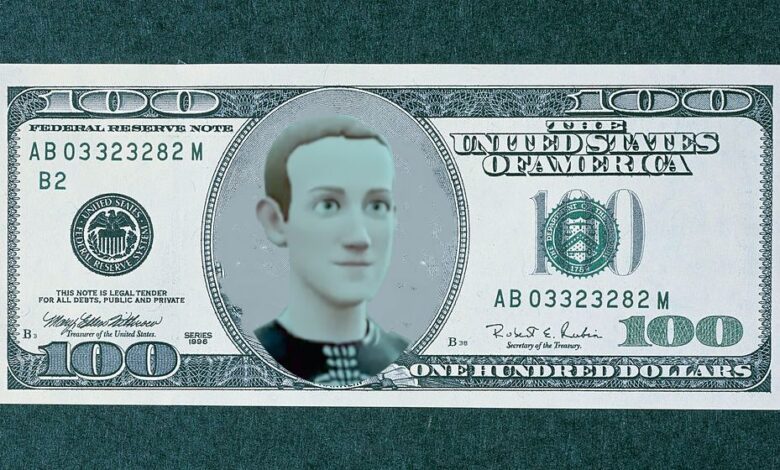Meta is planning to roll out “ZUCK BUCKS”
The social media giant is seeking alternative revenue streams as the popularity of its main products is falling and people are getting more serious about their privacy.

Meta has attracted plans to present virtual coins, tokens and credit services to its applications, as Facebook’s parent organisation seeks after its financial ambitions even after the breakdown of a venture to launch a digital currency.
The organisation, driven by CEO Mark Zuckerberg, is looking for elective income streams and new highlights that can draw in and hold clients, as ubiquity succumbs for main social networking products such as Facebook and Instagram – a pattern that undermines its $118bn-a-year promotion based business model.
Facebook’s financial arm, Meta Financial Technologies, has been exploring the creation of a virtual currency for the metaverse, which employees internally have dubbed “Zuck Bucks”, according to several people familiar with the efforts.
This is probably not going to be a digital currency based on the blockchain, several people said. Meta is inclining towards presenting in-application tokens that would be centrally controlled by the company, like those pre-owned in gaming applications.
According to company memos and people close to the plans, Meta is also looking into the creation of “social tokens” or “reputation tokens”, which could be issued as rewards for meaningful contributions in Facebook groups, for example. Another effort is to make “creator coins” that might be associated with particular influencers on its photo-sharing app Instagram.
Meta has additionally been interested in more conventional financial services, with an emphasis on assisting with giving private company loans at appealing rates, as indicated by a few groups acquainted with the project. While immediately planned, the company has recently had conversations with potential loaning partners, one individual said.
The majority of the endeavours are in the beginning phases of being discussed and could change or be dropped, although its arrangements to coordinate non-fungible tokens (NFTs) into its applications are more evolved. Zuckerberg affirmed a previous Financial Times report that Instagram would soon begin to help NFTs.
As per one memo shared internally last week, Meta plans to send off a pilot for posting and sharing NFTs on Facebook in mid-May. This will be “immediately followed” by testing of a component that will permit the participation of Facebook groups based on NFT possession and one more for minting – a term for making – NFTs.
NFTs might be monetised by employing “fees and/or ads” later on, as indicated by another internal record.
Meta lost more than $220bn from its market valuation in February on the day it revealed users were investing time in more current adversaries, for example, short-structure video application TikTok.
The organisation has as of late tried to find different sources of income and back web-based business on the stage, digging into digital currencies and blockchain innovation. Its huge tech rivals, for example, Google and Apple, have been warier about plunging into early space.
However, the move has been tormented by difficulties and administrative examination. Recently, the worldwide cryptocurrency project that it initiated, Diem, was slowed down and its resources were offered to Californian bank Silvergate after US controllers would not give the pilot the go-ahead over financial dependability and rivalry concerns.
Amid disappointments, Meta’s monetary division has endured what one previous representative portrayed as a “mass migration” of staff throughout recent months. Its head David Marcus left toward the end of last year, alongside key specialists, consistent staff and almost its whole legal group.
The individuals who remain are investigating how to make or support advanced monetary standards in its metaverse – a symbol filled virtual world that Zuckerberg expects will ultimately create billions of dollars in trade for computerised labour and products.
The new plans address a long way from Diem and the dream of making a digital currency. Staff members are presently attempting to track down the least regulated method for offering a digital currency, two individuals said, with a computerized symbolic that did not depend on the blockchain arising as the most appealing choice.
It wouldn’t be the first time Facebook has acquainted such a currency with its ecosystem. It launched Facebook Credits in 2009, the virtual money that empowered clients to make in-application buys, normally in games like FarmVille. This addressed 16% of incomes at the hour of its first sale of stock in 2012, as per Barclays, yet was closed down in 2013 because it was too exorbitant to even think about keeping up with.
In a memo from late January, the new head of Meta’s finance division, Stephane Kasriel, wrote: “We’re making changes to our product strategy and road map . . . so we can prioritise on building for the metaverse and on what payments and financial services will look like in this digital world.”
Kasriel, who replaced Marcus, said the company would “accelerate” investments in facilitating payments within WhatsApp and Messenger and in “helping creators monetise their activity”, for example through NFTs.
He also signalled plans to merge its wallet for Facebook Pay — is existing peer-to-peer payments system that does not use blockchain technology — with Novi, the digital currency wallet that was initially supposed to hold the Diem coin.
“The wallet will offer payments, identity and digital asset management within the [family of apps and Reality Labs, its virtual and augmented reality arm,] and over time, to other apps/sites,” he said. Where some of Meta’s efforts are focused on digital payments, other efforts are part of broader plans to use blockchain technology to introduce more “decentralisation” across its platforms, amid a growing buzz in Silicon Valley around the so-called Web3 movement.
Web3 advocates ordinarily try to use circulated record innovation to permit clients more control and responsibility for information and disintermediate large tech bunches that normally adapt that information as a feature of their advertisement based plans of action.
Yet, Meta gives off the impression of embracing some Web3 goals. It is investigating whether to store information on a blockchain, how it could give clients more command over their computerised personality and whether their character or records can be moved to, or utilised across, different stages past Meta’s applications, as per one arranging report.
In the interim, its arrangements to compensate clients for valid substances with social tokens could permit Meta to eliminate itself as a focal substance arbitrator and give Facebook people more power in directing themselves, as indicated by the report.



